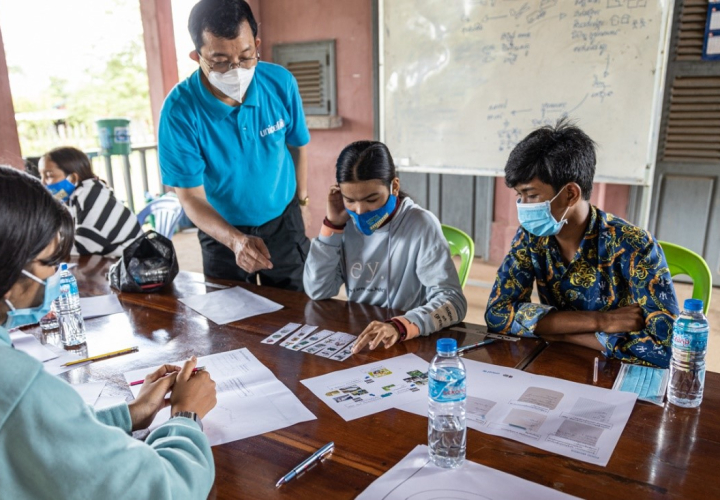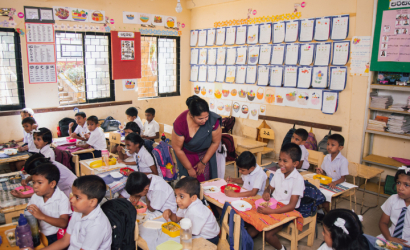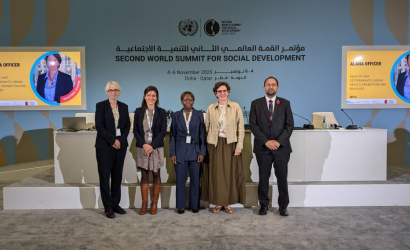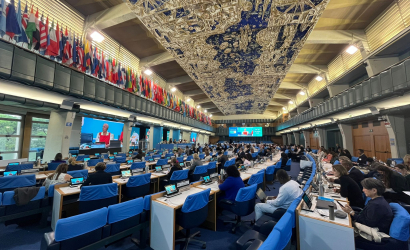The start of each year brings new promise and offers a chance to refresh. This was particularly the case in 2021, as UN Nutrition ‒ including its new secretariat ‒ got its feet on the ground and the Scaling Up Nutrition (SUN) Movement initiated its much anticipated third phase of activity. It also largely coincided with a turnover in the UN representation in the SUN Executive Committee (ExCom), offering additional opportunities to reflect on and reform how the United Nations System engages in the Movement.
“The launch of SUN 3.0, coinciding with the 2021 Year of Action on Nutrition, provides an opportunity for all nutrition stakeholders to reaffirm our commitment to the multi-sectoral, multi-stakeholder SUN approach, and to scale up our efforts to implement it, responding to increasing needs due to COVID-19,”
says Allison Oman Lawi, Director, a.i. of the Nutrition Division at the World Food Programme (WFP) and one of two UN representatives in the SUN ExCom. Fast forward six months and the following picture emerges.
Empowering governments to take the lead
The SUN 3.0 strategy places an emphasis on country leadership and results, calling upon networks to align action behind national priorities. Allison considers that,
“The SUN 3.0 focus on greater country ownership and leadership is a major strength.”
UN Nutrition has a comparative advantage of working at the country level, in view of the UN’s longstanding relations with and access to government, including in fragile contexts. During the third phase of SUN, the UN agencies will continue to coordinate their work as a network and in support of government nutrition efforts, as part of the SUN multi-stakeholder platforms.
UN Nutrition is in the process of developing its country support strategy, integrating the REACH model. This will outline how the new entity helps countries increase alignment on nutrition within the UN System and advance progress towards the 2030 Agenda, given nutrition’s links to all of the Sustainable Development Goals (SDGs). UN Nutrition also sees this as a unique opportunity to increase its country outreach to both SUN and non-SUN countries.
Valerie Julliand, UN Resident Coordinator in Indonesia sees the new United Nations Sustainable Development Cooperation Framework (UNSDCF) as a blueprint for collaboration between the UN and government on priorities areas, with nutrition being one of them. United Nations Resident Coordinators (UNRCs) are well positioned to champion inter-agency collaboration on nutrition in SUN (and non-SUN) countries to have a greater impact.
“As the UN, we have used the diversity and complementary of who we are to advance the different facets of the national nutrition agenda,”
she explained during a regional roundtable event, co-organized by the SUN Movement Secretariat (SMS) and the Global Nutrition Report (GNR) team. Valerie also reaffirmed that the UN community in-country will continue to advocate for nutrition and reach out to new members, cognizant that it is an essential building block for SDGs.
In phase 3, UN Nutrition continues to work with Members of Parliament (MPs) to bolster political support for nutrition. For example, the Food and Agriculture Organization of the United Nations (FAO), the United Nations Children’s Fund (UNICEF) and the World Health Organization (WHO) worked with the Inter-Parliamentary Union (IPU), NEPAD/AUDA and SMS to develop a Food Systems and Nutrition Handbook for MPs that was released in April. In some countries, such as Chad, Liberia, Sierra Leone and Zimbabwe, parliamentarian sensitization activities have been pursued through the REACH country support mechanism. Furthermore, UNICEF has been stewarding the commitment-making process in the context of the Global Action Plan on Child Wasting (GAP), working with other UN agencies such as FAO and WFP in several countries. UNRCs have also been mobilized for the cause through a joint letter from the UN Nutrition Chair, Naoko Yamamoto, and United Nations Assistant Secretary-General and Coordinator of the SUN Movement, Gerda Verburg, disseminated to all 64 countries. The UN Nutrition Secretariat and SMS have teamed up in a series of follow-up calls with UNRCs in Haiti, Kenya, Nepal and other countries to learn about how UN colleagues are promoting the Year of Action on Nutrition and offer support.
Working to transform food systems so that they deliver healthy diets for all
With the gears of SUN 3.0 now in motion and the UN Food Systems Summit (FSS) approaching, UN colleagues have been working to integrate nutrition in the FSS dialogues, including those taking place at the country level.
“Good nutrition starts with what we eat. This means transforming to more efficient, inclusive, resilient, and sustainable food systems that enable healthy diets is fundamental for addressing all forms of malnutrition,”
says Nancy Aburto, Deputy Director of the Food and Nutrition Division at FAO and UN Representative on the ExCom. The UN Nutrition group in Cambodia has been particularly effective, working jointly with the SUN Country Coordinator who duals as the National Convener for FSS, government councils and ministries, the SUN Civil Society Alliance Coordinator and the SUN Donor Network Convenor to organize twenty-six dialogues at the national and sub-national levels. This has contributed to the mounting the momentum around the national nutrition agenda and brought new actors into the nutrition arena. UN colleagues from Cambodia will highlight nutrition challenges and solutions for food systems transformation, including those related to multi-stakeholder engagement, during a parallel session at the FSS pre-meeting (26th July), organized by the SUN Global Support System (GSS).[2]
The UN Nutrition Secretariat is also working with member agencies to organize a parallel session on Putting Nutrition at the Centre of Food Systems Transformation to be held on 27th July. This session will apply a human rights lens and advocate for increased emphasis on nutrition across all Action Tracks and Areas. It will position nutrition as part of the solution to fix broken food systems, underscoring the need for improved governance, the importance of child nutrition, a stronger focus on gender equality and strengthened community engagement and empowerment. UNICEF Executive Director and Chair of the SUN Lead Group, Henrietta H. Fore, will speak at the event, helping to attract attention and boost ongoing nutrition advocacy.
Addressing inequities
Nutrition is an entry point for sensitive issues such as sexual and reproductive health, gender equality and other inequities. Promoting women’s empowerment and enshrining youth leadership across the Movement are other key aspects of SUN 3.0. Countries continue to draw upon UN Nutrition’s multi-sectoral tools,[3] such as the Policy and Plan Overview (PPO) and the Nutrition Stakeholder and Action Mapping, to analyze gender-related bottlenecks and portray women’s empowerment and adolescent nutrition as levers for addressing malnutrition as well as for broader sustainable development. Gender considerations have also featured in the UN Nutrition discussion paper series on sustainable healthy diets launched in May in view of its inextricable linkages with nutrition.
UN Nutrition has also taken concrete measures to foster youth engagement in nutrition planning, both at the country and global levels.
“For young people the stakes are high when it comes to food systems. Not only do they need healthy, sustainable nutrition to grow and learn, but they will have to live on a planet that can be severely impacted by how food systems operate,”
says Foroogh Foyouzat, UNICEF’s Representative in Cambodia. In some countries, like Cambodia, the UN agencies have engaged children and adolescents meaningfully in FSS dialogues, cognizant that young people can be both recipients and active participants of food system transformation.
Members of the UN Nutrition Secretariat joined others from the SUN GSS to organize a CFS 48 side event on Shaping the future of the food systems for the youth, with the youth, where Pierre Momcilovic from the Fill the Nutrient Gap team at WFP participated as a panelist stressing the importance of good nutrition during adolescence. Youth activist, Lana Weidgenant, who serves as the Vice-Chair of FSS Action Track 2 on Shifting to Sustainable Consumption Patterns, was part of a dynamic panel that discussed livestock-derived foods in the context of sustainable healthy diets, during a recent UN Nutrition webinar, held as part of the WHO Health Talks week. Her intervention was crucial in acknowledging regional differences in this complex issue and highlighting that the overconsumption of meat and dairy in industrialized countries is contributing to climate, biodiversity and health crises. She also urged for large-scale action, such as incorporating environmental sustainability considerations into national dietary recommendations, aligning food that is served in public institutions with those recommendations, reforming government subsidies and ensuring a just transition so that farmers are not left behind.
Knowledge management and learning to catalyse progress
This third phase of the SUN Movement is also an opportunity to learn from prior experiences and promote peer learning. With knowledge management (KM) firmly engrained in UN Nutrition’s core functions, UN Nutrition is playing a large role in this sphere. This starts with UN Nutrition’s efforts in thought leadership, encompassing a range of activities such as the release of new discussion papers that pool technical expertise from the agencies. In May, the UN Nutrition Secretariat launched a discussion paper on The role of aquatic foods in sustainable healthy diets followed by one on Livestock-derived foods and sustainable healthy diets, released in June. In addition, it has also recently established an editorial board to steer work on the new UN Nutrition Journal and is taking complementary measures to increase access to articles co-authored by UN colleagues from members agencies that have been published in other peer-reviewed journals. Its ‘interview corner’ will soon be debuted in the UN Nutrition newsletter where UN colleagues around the world will have the opportunity to share their perspectives for a vibrant learning exchange, helping to enhance feedback loops between the country and global levels. Of course, these activities are backed by a series of learning initiatives conducted through the member agencies, such as the partnership between FAO’s e-learning academy and SUN.
Looking ahead
UN Nutrition is stepping up and pushing forward, after its careful first steps during the first semester. Its commitment to deliver as one, speak with one UN voice for nutrition and determination to succeed will help it rise to the complex challenges of today’s world from climate change to the COVID-19 pandemic. In addition to contributing to a fruitful third phase of the SUN Movement, UN Nutrition will bring together the technical expertise of its member agencies, encourage increased uptake of global guidance, advocate for nutrition at all levels, build a joint UN narrative around emerging issues, help cross-fertilize learning among countries and bring their insights to global process and bolster collective action for nutrition to deliver the 2030 Agenda. Every step counts.



